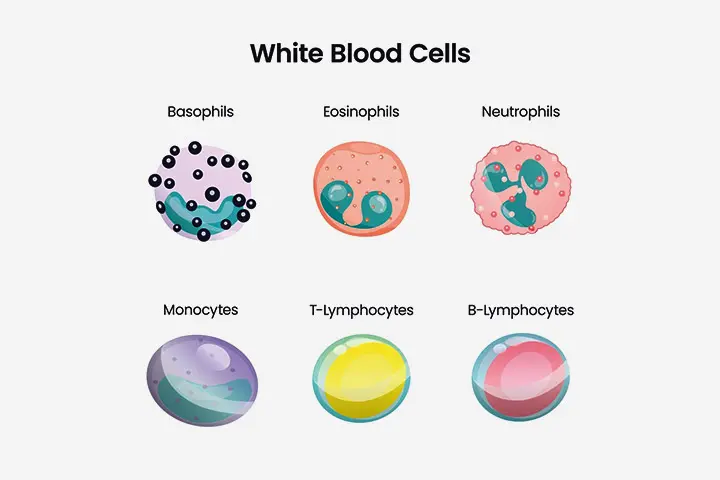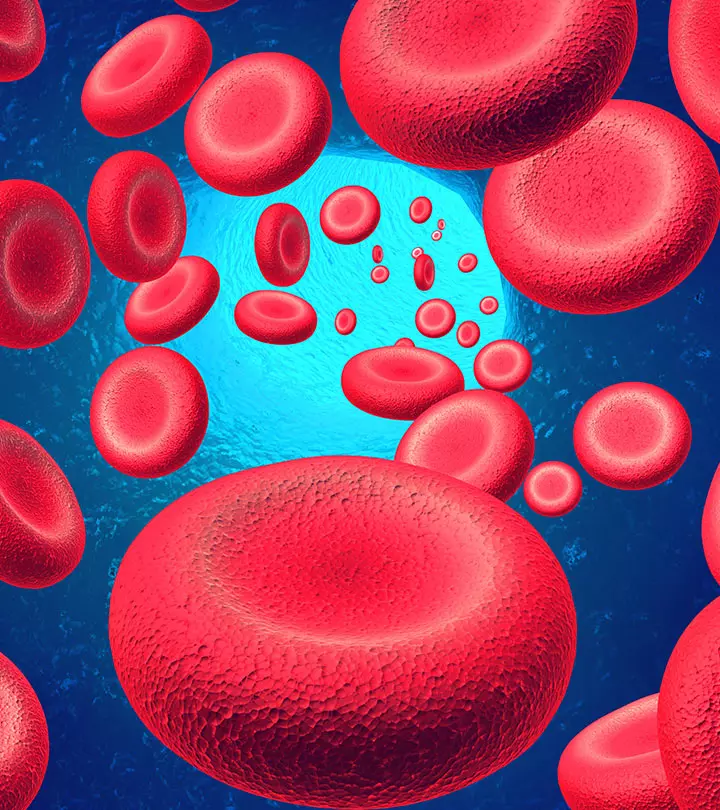
Image: Shutterstock
During pregnancy, your blood volume increases by up to 50% which also includes a high WBC count in pregnancy. With a decline in hemoglobin levels and hematocritiThe percentage of red blood cells (RBCs) in blood (particularly in the last trimester), the platelet count also slightly decreases. But, the white blood cells (WBCs) in the blood increase following pregnancy, termed leukocytosis.

Leukocytes or WBCs are classified as agranulocytes (lymphocytes and monocytes) and granulocytes (eosinophils, neutrophils, and basophils), which make up the body’s immune system and fight against infection (1).
Read this post to know about the causes of high WBC count in pregnancy and the complications associated with this condition.
Key Pointers
- Increase in white blood cell (WBC) count during pregnancy might indicate several underlying conditions.
- Stress, dehydration, high blood pressure, gestational diabetes, and infections are common reasons behind a rise in WBCs during pregnancy.
- WBC or leukocyte count is a part of CBC (complete blood count), a routine serological test in pregnancy.
- It is necessary to get assessed by your physician to get an accurate interpretation and management of this condition to avoid potential complications.
What Is The White Blood Cell Count During Pregnancy?

Following pregnancy, there is a gradual increase in the normal WBC count (leukocytosis), with a slight shift toward an increased percentage of neutrophils.
Leukocytosis begins in the first trimester, continues throughout the pregnancy, peaks during delivery, and usually normalizes after four weeks (1) (2).
Obstetrician and gynecologist Dr. Veena Madhankumar says, “White blood cell count normally tends to rise during pregnancy. This increase is often not considered a concerning health crisis since many physiological changes occur during pregnancy, including a rise in white blood cell count. The immune system boosts WBC production to ensure both mother and baby are well protected. This physiological increase is often seen during the third trimester of pregnancy.”
| Trimesters | WBC (Leukocyte) count |
| Non-pregnant reference range | 4.8–10.8 x 103/mm3 |
| First and second trimesters | 6–16 x 103/mm3 (3.5 x 103/mm3 increase) |
| Third trimester | 20–30 x 103/mm3 |
However, several studies have associated high levels of leukocytosis in the first trimester with a complicated pregnancy, preeclampsiaiA pregnancy condition characterized by the onset of high blood pressure, protein in the urine, and water retention , and gestational diabetes mellitusiA condition characterized by elevated blood sugar levels due to hormonal and physical changes in pregnancy (GDM) (3) (4). Therefore, the leukocyte count is interpreted and correlated during your antenatal visits and postnatal care (1).
During pregnancy, the white blood cells are frequently examined to look for signs of infection or inflammation in the body. The WBC levels rise from eight to forty weeks into the gestational period. As seen in the graph below, they peak around the 32nd week and start sloping downward (12).

White blood cells in pregnancy
Source: White Blood Cells in PregnancyWhat Is The Role Of WBC In Pregnancy?

During pregnancy, the mother’s immune system changes that make her more susceptible to infections. This modulation has often led to the misconception that pregnancy causes an immunological weakness. However, contrary to this belief, the immune cells or WBCs remain active and functional, specifically adjusted to support the pregnancy. In fact, the WBC count remains elevated throughout the gestation period to facilitate and protect the pregnancy (16).
A 2025 review article highlighted that during pregnancy, 30–40% of a mother’s leucocytes (WBCs), including natural killer (NK) cells, dendritic cells (DCs), macrophages, neutrophils, and T lymphocytes, are recruited and accumulated at the site of implantation in the uterus to help with successful pregnancy (17).
Here are different functions of leucocytes during pregnancy:
- Uterine natural killer cells (uNK cells) facilitate trophoblast invasion within the uterus, helping successful embryo implantation
- Uterine dendritic cells (uDCs) help in the maternal decidual formation and regulate the maternal immune system to tolerate the fetus
- Monocytes help in secreting several cytokines, which helps in trophoblast development and function
- Neutrophils interact with T cells for the secretion of immune cells necessary for correct placental development
- Macrophages help in trophoblast invasion, remodeling the placenta and uterine stroma, promoting embryo growth while defending the mother against infection (18)
- T lymphocytes (T cells) help in development and maintenance of embryo and help suppress maternal immune responses against fetal antigens (19)
What Are The Causes of High WBC Count During Pregnancy?
Liesel Teen, BSN, a registered labor and delivery nurse from Raleigh, North Carolina, says, “Even in healthy pregnancies, it is normal for a woman’s WBC count to increase, especially towards the end of pregnancy. However, if this elevation is accompanied by any signs of infection or other medical conditions, it likely will warrant further testing and evaluation.
“Specific causes of elevated WBC counts include bacterial or viral infections, leukemia, rheumatoid arthritis, tuberculosis, certain medications (such as epinephrineiA hormone as well as a neurotransmitter responsible for the body’s fight or flight response or corticosteroids), severe allergic reactions, and even severe stress. Any bacterial or viral infection in the body can result in an elevation in a person’s white blood cell count.”
In general, an increased WBC count indicates (1)
- Acute infection
- Trauma
- Dehydration

However, due to the physiological stress caused by pregnancy, you may have a higher WBC count even in normal pregnancy. Hence, maternal WBC count cannot be a primary screening technique for detecting severe pregnancy complications (5). Conversely, an increased WBC count or leukocytes in urine during pregnancy indicates a urinary tract infection (UTI) (6).
Recollecting the events during a visit to the emergency room (due to suspected blood in urine) during pregnancy, a mother of twin girls says, “Doctor came in to inform me of my elevated WBC (white blood cell) count and yes, in fact, blood in my urine. I ended up being diagnosed with a minor bladder infection, causing the blood in my urine. Preggo-friendly antibiotics would do the trick to clear it up (i).”

Pregnancy demands a complex physiological response where the endocrine systemiA complex system of glands and organs that produce hormones , metabolic processes, and genital system undergo several changes to nourish the developing fetus and prepare the body for labor and delivery. As your pregnancy progresses, this physiological and emotional stress raises your leukocyte count as the leukocytes accept stimulatory impulses (7).
What Does The WBC Differential Count Indicate In Pregnancy?
During a healthy pregnancy, leukocytosis is generally referred to as an increased percentage of neutrophils in the blood. However, there are many types of WBCs, and elevated levels of other WBCs may imply different diagnoses (1) (8).
- Neutrophils: An increased level of neutrophils (neutrophilia) generally indicates acute bacterial infection, burns, acute stress, leukemia (blood cancer), rheumatoid arthritis, and steroid use. However, neutrophilia is normal during pregnancy due to impaired neutrophil apoptosis and may not have any clinical significance.
 Quick fact
Quick fact- Eosinophils: Eosinophilia (high eosinophil count) usually indicates the presence of allergic conditions, parasitic infections, and leukemia polyarteritis nodosa autoimmune disease. However, it also decreases with gestational age (mostly in the third trimester).
- Basophils: Basophilia (high basophil count) is generally caused by allergic conditions, chronic myelogenous leukemia, Hodgkin’s disease, and oral contraceptive usage. However, it also decreases as your gestation advances.
- Monocytes: Monocytes are the largest WBCs, and monocytosis (high monocyte count) is generally caused by chronic inflammation, Cushing’s syndrome, viral infection, and bacterial infections such as tuberculosis. During pregnancy, there is an absolute monocytosis, especially in the first trimester, but this reduces as your gestation advances.
- Lymphocytes: Lymphocytosis (high lymphocyte count) is generally caused by viral infections, leukemias, and adrenal insufficiency. However, an increase in the lymphocyte percentage in the WBCs during pregnancy may indicate a bacterial infection.
 Quick fact
Quick factHow To Diagnose High WBC Count During Pregnancy?

Routine blood tests, such as a complete blood count or CBC test during pregnancy, typically measure the leukocyte count. Your doctor may carry out diagnostic tests for hemoglobin, WBC, and platelet counts in almost every prenatal care visit to look for conditions that may complicate the pregnancy (6). Follow-up tests may be needed if they detect unusually high WBC count in pregnancy as they can help monitor any underlying conditions or complications that might need treatment.
What Are The Signs Of High WBC Count During Pregnancy?

An elevated white blood cell count may not present any symptoms in pregnancy. However, the symptoms of a high WBC count in non-pregnant people usually include (9) (10)
- Fever or chills
- Swelling or inflammation
- Bruising/bleeding tendency
- Fatigue
- ImmunosuppressioniA reduction in the efficacy or strength of the immune system
- Night sweats
- Weight loss
If you detect any of these symptoms while pregnant, contact your healthcare provider, as it may be a sign of infection or underlying medical complications.
Can A High WBC Count Cause Miscarriage?
While leukocytosis is common during pregnancy, it could also result from an underlying problem that typical prenatal WBC count tests cannot detect, necessitating extra screening. In the first trimester, higher platelet levels and WBC counts are linked to a higher risk of miscarriage, thus highlighting the significance of monitoring these markers for potential pregnancy complications (5) (11).
Frequently Asked Questions
1. Can preeclampsia cause a high white blood cell count?
Yes, studies have revealed that preeclampsia can lead to an elevation in white blood cell levels (3).
2. What WBC count in pregnancy indicates leukemia?
A blood count falling in the range of 100,000 – 400,000 indicates the presence of leukemia (12).
3. How does a high WBC count affect the immune system during pregnancy?
A high WBC count in pregnancy, also known as leucocytosis, is induced by the physiological stress of pregnancy. A moderate increase in WBC count during pregnancy is normal. However, if the WBC count rises abnormally, it may indicate an underlying condition or infection (8).
4. What precautions can be taken to prevent a high WBC count in pregnancy?
Routine blood tests conducted by healthcare providers throughout pregnancy help monitor any potential abnormalities and ensure the well-being of both the mother and the baby. However, you may take general precautions, such as maintaining hygiene, staying hydrated, eating a well-balanced diet, and religiously following prescribed medications, to minimize the risk of infections and inflammatory conditions (14). Smoking, race, and high body mass index (BMI) are risk factors for leucocytosis that are unrelated to pregnancy. To reduce these risks, quit tobacco and alcohol use and exercise regularly to maintain healthy weight. However, do not overexert yourself when doing exercises during pregnancy (15).
Although there could be no characteristic signs to depict a high WBC count in pregnancy, some women could experience a tendency to bleed easily, high fever, tiredness, and weight loss. In addition, during pregnancy, there may be an increase in the white blood cell (WBC) count that begins as early as the first trimester. This is due to the sudden pregnancy-related changes that occur in the body. While a slight increase in WBC count could be expected during pregnancy, it might sometimes be a sign of infections, dehydration, or other medical problems. Therefore, it is ideal to seek medical attention if you experience any atypical symptoms when pregnant to prevent adversities that could impact maternal well-being.
Infographic: Significance Of Increased White Blood Cell Differential Count In Pregnancy
One of the hematological parameters during pregnancy is an elevated white blood cell (WBC) count (leukocytosis), which is typically normal. However, some underlying problems may also increase WBC count during pregnancy. The infographic below covers the implications of the increase in different white blood cells during pregnancy.
Some thing wrong with infographic shortcode. please verify shortcode syntax
Learn about the symptoms of an elevated white blood cell (WBC) count and effective management techniques. Get the answers you need to stay healthy during pregnancy.
Personal Experience: Source
MomJunction articles include first-hand experiences to provide you with better insights through real-life narratives. Here are the sources of personal accounts referenced in this article.
i. A not-so-emergent emergency;https://themasseyspot.blogspot.com/2012/07/
References
- David Nzioka Mutua et al.; (2018); Hematological Profile of Normal Pregnant Women.
https://www.hilarispublisher.com/open-access/hematological-profile-of-normal-pregnant-women-2165-7831-1000220.pdf - Pregnancy: laboratory measurements.
https://www.openanesthesia.org/keywords/pregnancy_laboratory_measurements/ - Bernard J. Canzoneri et al.; (2011); Increased Neutrophil Numbers Account for Leukocytosis in Women with Preeclampsia.
https://www.ncbi.nlm.nih.gov/pmc/articles/PMC3062252/ - Tiange Sun et al.; (2025); Elevated First-Trimester Neutrophil Count Is Closely Associated With the Development of Maternal Gestational Diabetes Mellitus and Adverse Pregnancy Outcomes.
https://diabetes.diabetesjournals.org/content/69/7/1401 - Ivana Musilova et al.; (2017); Maternal white blood cell count cannot identify the presence of microbial invasion of the amniotic cavity or intra-amniotic inflammation in women with preterm prelabor rupture of membranes.
https://www.ncbi.nlm.nih.gov/pmc/articles/PMC5726631/ - Routine Tests During Pregnancy.
https://www.acog.org/womens-health/faqs/routine-tests-during-pregnancy - Priya Soma-Pillay et al.; (2016); Physiological changes in pregnancy.
https://www.ncbi.nlm.nih.gov/pmc/articles/PMC4928162/ - Surabhi Chandra et al.; (2012); Physiological Changes in Hematological Parameters During Pregnancy.
https://www.ncbi.nlm.nih.gov/pmc/articles/PMC3422383/ - Lyrad K. Riley and Jedda Rupert; (2015); Evaluation of Patients with Leukocytosis.
https://www.aafp.org/pubs/afp/issues/2015/1201/p1004.html - High White Blood Cell Count: Causes, Symptoms and Treatment.
https://www.narayanahealth.org/blog/high-white-blood-cell-count-causes-symptoms-treatment - Naser Al-Husban et al.; (2019); Platelet and White Blood Cell (WBC) Counts in the First Trimester and Pregnancy Outcome: Prospective Controlled Study.
https://idp.springer.com/authorize?response_type=cookie&client_id=springerlink&redirect_uri=https%3A%2F%2Flink.springer.com%2Farticle%2F10.1007%2Fs40556-019-00202-0 - How Fast Does Leukemia Develop?
https://www.roswellpark.org/cancertalk/201810/how-fast-does-leukemia-develop - White Blood Cells In Pregnancy : Reference Intervals For Before and After Delivery.
https://www.thelancet.com/journals/ebiom/article/PIIS2352-3964(21)00509-0/fulltext - High White Blood Cell Count
https://my.clevelandclinic.org/health/diseases/17704-high-white-blood-cell-count - Xi Wang et al.; (2025); Pregnancy-induced leukocytosis: A case report.
https://pmc.ncbi.nlm.nih.gov/articles/PMC9851002/ - Gil Mor et al.; (2012); Inflammation and pregnancy: the role of the immune system at the implantation site.
https://pmc.ncbi.nlm.nih.gov/articles/PMC3078586/ - Serena Bert et al.; (2025); Neutrophils in pregnancy: New insights into innate and adaptive immune regulation.
https://pmc.ncbi.nlm.nih.gov/articles/PMC8561097/ - Marijke M. Faas et al.; (2014); Monocytes and macrophages in pregnancy and pre-eclampsia.
https://www.frontiersin.org/journals/immunology/articles/10.3389/fimmu.2014.00298/full - Marie-Pierre Piccinni; (2005); T cells in pregnancy.
https://pubmed.ncbi.nlm.nih.gov/16129948/
Community Experiences
Join the conversation and become a part of our nurturing community! Share your stories, experiences, and insights to connect with fellow parents.
Read full bio of Dr. Miguel Angel Razo Osorio

Dr. Veena Madhankumar is an experienced obstetrician and gynecologist with 25 years of clinical expertise. She completed her MBBS from Coimbatore Medical College, India, in 1999 and pursued her MD in Obstetrics and Gynecology from Sri Ramachandra Medical College, Chennai, India. Dr. Madhankumar has been associated with iCliniq for over a decade, providing expert medical consultations and guidance. She has also established a practical laparoscopy training course.
Dr. Veena Madhankumar is an experienced obstetrician and gynecologist with 25 years of clinical expertise. She completed her MBBS from Coimbatore Medical College, India, in 1999 and pursued her MD in Obstetrics and Gynecology from Sri Ramachandra Medical College, Chennai, India. Dr. Madhankumar has been associated with iCliniq for over a decade, providing expert medical consultations and guidance. She has also established a practical laparoscopy training course.
- Liesel Teen is a labor and delivery nurse and the founder of Mommy Labor Nurse, which offers birth classes to pregnant women. Liesel did her nursing degree at The University of North Carolina Wilmington and has eight years of experience as a bedside labor and delivery nurse.
 Liesel Teen is a labor and delivery nurse and the founder of Mommy Labor Nurse, which offers birth classes to pregnant women. Liesel did her nursing degree at The University of North Carolina Wilmington and has eight years of experience as a bedside labor and delivery nurse.
Liesel Teen is a labor and delivery nurse and the founder of Mommy Labor Nurse, which offers birth classes to pregnant women. Liesel did her nursing degree at The University of North Carolina Wilmington and has eight years of experience as a bedside labor and delivery nurse.
Read full bio of Reshmi Das
Read full bio of Rebecca Malachi
Read full bio of Aneesha Amonz


















